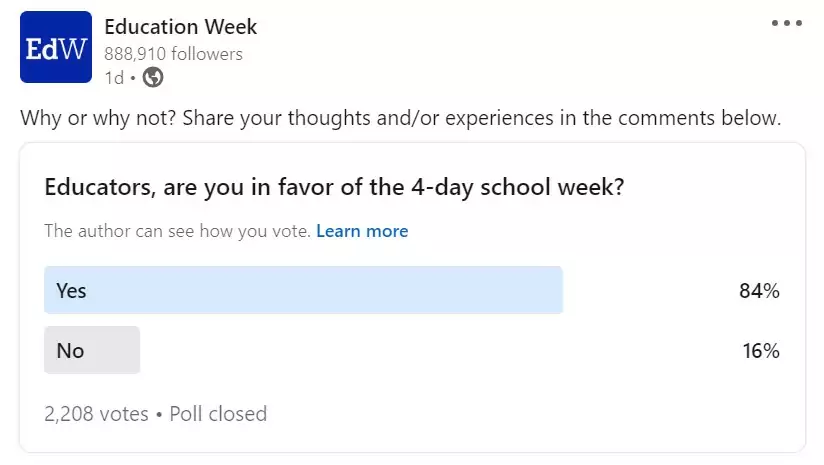A 4-day school week initiative is not a new sensation. While some schools are actively endorsing this new policy, other educators weighing the pros and cons.

✅ AI Essay Writer ✅ AI Detector ✅ Plagchecker ✅ Paraphraser
✅ Summarizer ✅ Citation Generator
Key Takeaways:
- The idea of switching from traditional 5-day school weeks to shorter 4-day ones has been arond for a few decades.
- Teachers have devided into two camps regarding the new initiative.
- There is no tangible survey regarding the benefits of the 4-day school week proposal.
The idea of a 4-day school week because popular in rural areas of the USA where schools face budgetary constraints and staff shortages. In recent years, hundreds of districts across the country have adopted the alternative weekly schedule. Despite that teachers and staff are working fewer days, they still put the same number of hours into teaching and working with students.
Education Week, an American newspaper that covers K-12 education news, has started a pool on their LinkedIn account asking tutors their opinion about a 4-day school week alternative.

Some educators believe strongly in maintaining or even expanding the number of days in the school week, viewing schools as institutions built to serve children, families, and society at large:
“American education has many functions. One is custodial. Our 5-day school week corresponds to the 5-day work week. What would gain more traction would be a 6-day school week or year-round school. We should remember that schools are institutions built to serve children, families, and society.”
Brett Bertucio
“While I agree with this thought, I argue that this is why teachers should be paid considerably more as they serve a key function in society.”
Erica Warren
Other educators acknowledge the complexity of transitioning to a 4-day school week, emphasizing that such a shift would require careful planning and adjustments to both curriculum and childcare arrangements:
“I favor a 4-day week because it would reduce parents’ need to pull students out of school for appointments and allow teachers a day of real prep. However, that needs to be augmented with child care as most parents can’t flip their work schedules to 4 days or align those schedules with a 4-day school week.”
Shannon Y. Richardson
“The concept of a 4-day school week has both potential benefits and challenges. On the positive side, it could provide students with longer uninterrupted learning periods, potentially allowing for deeper engagement and more focused learning. However, it’s crucial to consider the impact on students’ academic progress, as the condensed schedule might lead to longer gaps between instruction. Additionally, parents might face challenges with childcare arrangements on the extra day off. The success of a 4-day school week would depend on careful planning, curriculum adjustments, and understanding the specific needs of the school community.”
Manish V.
“A shorter week means less time for teaching and learning. Put the focus on these fundamentals, rather than on assessment. Block chunks of time on the timetable for meaningful learning opportunities, rather than fragmenting the school day. By all means use the fifth day differently, but don’t rob kids of their education. They have already lost so much through the pandemic.”
Jenny Wright
While the educators slightly have different points of view due to different experiences, they share concerns about the impact on student’s academic progress and the practicalities that families would face, such as childcare.
This debate shows that there are many ifs and buts on the way to fully commit to the idea of a 4-day school week. Most importantly, it requires a lot of planning before being introduced to schools.
Pros and Cons of Adopting a Four-Day School Week
Debates over this initiative have been going on for a long time. Usually, before implementing something, it is worth weighing all the advantages and disadvantages. Here are the potential pros and cons a new initiative can bring in classrooms.
| Pros | Cons |
| Cost Savings (transportation, food, energy) | Longer school days may be hard for young students |
| Improved Student Attendance | Challenges for families in finding affordable care on day off |
| Increased Teacher Morale | Food insecurity for some students on the off-day |
| Helps in recruiting teachers | Limited access to optional activities due to transportation |
Proponents argue that a four-day week can save money on operational costs and help attract quality teachers, particularly in rural districts. They also claim that longer weekends result in better student attendance and improved academic performance. Additionally, teachers benefit from an extra day for lesson planning and professional development, which can lead to increased job satisfaction and effectiveness.
On the other hand, critics point out the strain of longer school days, particularly for younger students, and the challenges posed to families who must find care for the off day. Additionally, food insecurity and lack of access to optional activities on the fifth day are concerns.
Follow us on Reddit for more insights and updates.





Comments (0)
Welcome to A*Help comments!
We’re all about debate and discussion at A*Help.
We value the diverse opinions of users, so you may find points of view that you don’t agree with. And that’s cool. However, there are certain things we’re not OK with: attempts to manipulate our data in any way, for example, or the posting of discriminative, offensive, hateful, or disparaging material.